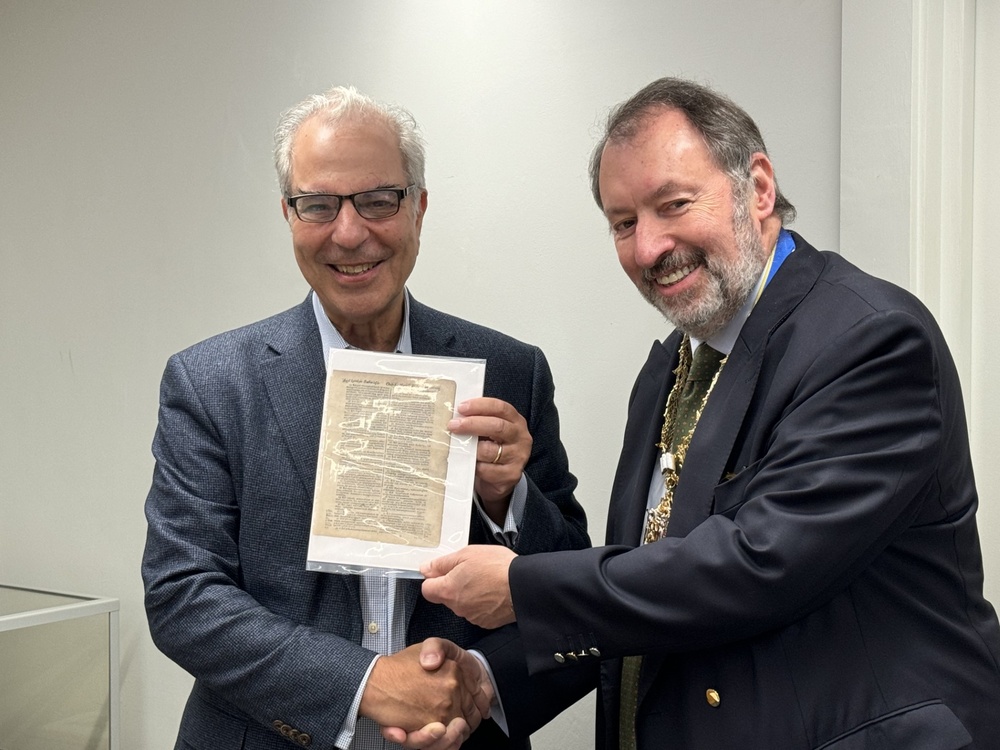A NEW ADDITION TO THE COMPANY'S TREASURES
18 SEPTEMBER 2024

We’re excited to share news of a unique and an extremely generous gift to the Stationers’ Company from one of our U.S. members, Roger Rosen: a leaf from a historic Bible printed at Harvard in 1663.
Main image: Liveryman Roger Rosen presents a leaf of the 'Wampanoag Bible' (1663) to Master Paul Wilson
Often referred to as the Eliot Bible, this was not just the first bible to be printed in North America. It also represented the first large-scale attempt to translate a text from English into a Native American language. That language was Wôpanâak (referred to by settlers of the day as Wampanoag), an Indigenous language once spoken in the land between Provincetown, Massachusetts and Narragansett Bay, Rhode Island.
The translation was financed by London-based missionary organisation the Society for the Propagation of the Gospel in New England, aka the New England Company. Founded by an act of Oliver Cromwell’s Parliament in 1649, after the restoration of the monarchy the New England Company received a Royal Charter from Charles II. The Company had sufficient funds at its disposal to export a London compositor, Stationer Marmaduke Johnson, to work on the Bible.
The project was led by nonconformist minister John Eliot. Although Eliot was a keen student of Wôpanâak, the translation was a collaborative effort, depending on the contributions of native speakers. Those contributions went uncredited at the time, but modern scholarship has recovered the names of some of the translators: Job Nesuton, Cockenoe, John Sassamon, and Wawaus. Wawaus was known among the settler community as James Printer, having been put to work at Samuel Green’s Harvard printing press as a young child, and he also participated in the physical production of the Eliot Bible. After narrowly escaping attack by an English mob following the outbreak of King Philip’s War, Wawaus went on to act as a scribe for Metacomet/King Philip. He was granted amnesty after the war, and continued to work as a typesetter.
Wawaus’s story illustrates how colonialism distorted social relationships and allegiances between indigenous and settler communities. In fact, most American copies of the Eliot Bible were destroyed by Native Americans during King Philip’s War, in a symbolic rejection of the invaders’ culture. Yet, in an unexpected twist of history, the Bible has received a new lease of life in a completely different context. It has been a key resource in the work of the Wôpanâak Language Reclamation Project, which, in its own words, ‘seeks to preserve and strengthen the cultural heritage and identity of the Wampanoag Nation for future generations and to accept both the gift and responsibility that comes with the Language created especially for them by Creator.’ (from https://www.wlrp.org/project-history)
More information and references can be found here:
https://www.thecrimson.com/article/2024/3/2/eliot-bible/
Dippold, Steffi, “A Prince Went Up a Tree and Climbed into Colonial Typography: Or Reversing Lettered and Unlettered in the Wampanoag Bible.” The New England Quarterly, vol. 92, no. 1, 2019, pp. 6–45. JSTOR, https://www.jstor.org/stable/26607972. Accessed 18 Sept. 2024.